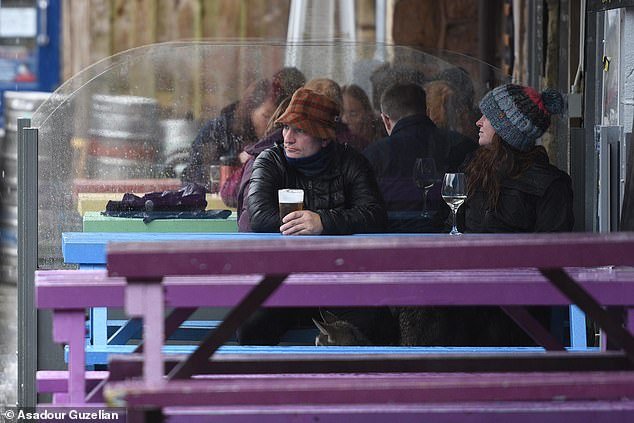No evidence that drinking alcohol after a Covid vaccine interferes with how it works, UK regulator says
- The MHRA says there is no evidence alcohol lowers the body’s response to jabs
- Drinkaware had previously suggested people abstain from booze for two weeks
- NHS patient literature and advice from manufacturers does not mention alcohol
Drinking alcohol does not interfere with how effective Covid vaccines are, the UK regulator has said.
Social media reports say people should abstain from alcohol up to two weeks after their vaccination to ensure the best immune response.
And in January advisers to alcohol education charity Drinkaware, which is funded by industry, suggested there was evidence heavy drinking may interfere with the body’s response to vaccines used in the UK.
But the Medicines and Healthcare products Regulatory Agency (MHRA) today said there is no evidence alcohol has any effect on vaccine efficacy.
There is also nothing in the patient information leaflets from the NHS or the vaccine manufacturers to suggest such a link.
Drinking alcohol does not interfere with how effective Covid vaccines are, the MHRA has said. Pictured: People enjoy a drink in the rain on Bank Holiday Monday at the Shoulder of Mutton pub in Hebden Bridge, West Yorkshire
The MHRA said: ‘There is currently no evidence that drinking alcohol interferes with the efficacy of the Covid-19 vaccines.
‘We would advise anyone concerned about this to talk to their healthcare professional.’
The regulator’s will come as welcome news to those already hesitant to have a vaccine.
Britain has dished out 34.5million first doses of the vaccine and some 15.5million have now had their second dose.
But Drinkaware’s statement in January advising people not to drink two days before or two weeks after their vaccination has been shared widely recently, leading to some confusion over the science behind alcohol and vaccines.
Writing on Twitter this morning, New Statesman journalist Rachel Cunliffe asked followers if anyone was ‘sticking’ to Drinkaware’s advice.
She said: ‘No alcohol for two weeks after being vaccinated: is anyone sticking to this?
‘Is there valid science backing it up, or is it just general precautionary messaging?’
Some studies have actually suggested small amounts of alcohol can boost immunity over the long term by reducing inflammation.
Heavy drinking is known to suppress the body’s immune system but has not yet been linked to lowering the body’s response to vaccines.
No studies have yet investigated the effects the efficacy of either the AstraZeneca or Pfizer vaccines specifically, according Dr Eleanor Gaunt, research fellow at the Roslin Institute of Edinburgh University.
But speaking in January, Dr Fiona Sim, chief medical adviser at Drinkaware, suggested everyone should ‘consider’ not drinking for two weeks after vaccination.
She said: ‘We are very keen to stress how important it is for you to get vaccinated.
‘We do know that, since the onset of the pandemic last year, between one fifth and one third of people have been drinking more than they do usually.
‘So, as far as alcohol is concerned, we advise that you consider not drinking for two days before, and up to two weeks after you’ve been vaccinated, to try to ensure your immune system is at its best to respond to the vaccine and protect you.
‘But it’s really important to know that, even if you do drink, you’ll still benefit from having the jab, so please don’t turn it down.
‘If you are a regular heavy drinker, the risks to you of becoming seriously ill if you do contract Covid-19 are particularly high, so please keep your appointment for vaccination if you are offered one.’
